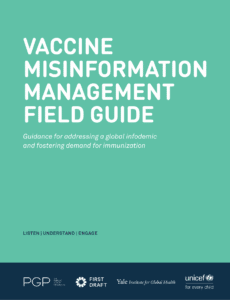Misinformation Alerts
Knowing what misinformation is being shared can help you generate effective messaging.
These insights are based on a combination of automated media monitoring and manual review by public health data analysts. Media data are publicly available data from many sources, such as social media, broadcast television, newspapers and magazines, news websites, online video, blogs, and more. Analysts from the Public Good Projects triangulate this data along with other data from fact checking organizations and investigative sources to provide an accurate, but not exhaustive, list of currently circulating misinformation.
Misinformation Alerts
Knowing what misinformation is being shared can help you generate effective messaging.
These insights are based on a combination of automated media monitoring and manual review by public health data analysts. Media data are publicly available data from many sources, such as social media, broadcast television, newspapers and magazines, news websites, online video, blogs, and more. Analysts from the Public Good Projects triangulate this data along with other data from fact checking organizations and investigative sources to provide an accurate, but not exhaustive, list of currently circulating misinformation.Alerts are categorized as high, medium, and low risk.
- High risk alerts: Narratives with widespread circulation across communities, high engagement, exponential velocity, and a high potential to impact health decisions. Are often more memorable than accurate information.
- Medium risk alerts: Narratives that are circulating in priority populations and pose some threat to health. Potential for further spread due to the tactics used or because of predicted velocity. Often highlights the questions and concerns of people.
- Low risk alerts: Narratives that are limited in reach, don’t impact your community, or lack the qualities necessary for future spread. May indicate information gaps, confusion, or concerns.
Several trending posts this week have referenced President Biden’s “COVID-19 rebound.” A congressperson’s social media post suggesting that COVID-19 vaccines are ineffective and questioning why they are mandated for soldiers received over 71,000 engagements.
Recommendation: COVID-19 rebound can occur after completing a course of the COVID-19 treatment Paxlovid when a person tests positive for COVID-19 or experiences mild symptoms within days of testing negative. Although Paxlovid rebound does not appear to cause serious symptoms, it is transmissible. Rebound after Paxlovid treatment is unrelated to vaccination status and is believed to be caused by insufficient treatment length. Vaccinated people remain at a significantly lower risk of serious illness, hospitalization, and death from COVID-19 than unvaccinated people. Fact Checking Source(s): 
An article on a well-known anti-vaccine website claims that medical professionals diagnose medical conditions to cover up vaccine side effects. The article’s most popular comment states that a “positive outcome” of COVID-19 is that people are now skeptical of all vaccines.
Recommendation: There is no evidence to support the claim that medical diagnoses are being used to cover up vaccine side effects. A common tactic of anti-vaccine advocates is to baselessly link vaccines to health conditions like SIDS and autism, even after potential links have been unequivocally disproven. Messaging may emphasize that vaccines go through lengthy and rigorous processes to make sure that they are safe and are continuously monitored for safety issues and that the risk of long-term effects from vaccine-preventable diseases is much greater than any risk from a vaccine. Emphasizing that vaccines are safe and protect children against diseases that can cause serious harm or death is recommended. Fact Checking Source(s): 
A video posted to social media claims that COVID-19 vaccines can trigger or worsen existing autoimmune diseases, including rheumatoid arthritis. The video has been viewed over a million times and shared nearly 20,000 times.
Recommendation: Explaining that there is no evidence to suggest that COVID-19 vaccines cause or trigger autoimmune diseases is recommended. People with rheumatoid arthritis and other autoimmune conditions are encouraged to be vaccinated against COVID-19 unless advised otherwise by their physician. Fact-Checking Source(s): 
A satire news site published a fabricated story claiming that the U.S. military found the anti-nausea drug scopolamine in COVID-19 vaccines meant for children. The Department of Defense, FDA, CDC, and Pfizer have all dismissed the story as completely false. The site published a similar hoax story in May when it falsely claimed that the U.S. military found pesticides in the Moderna vaccine.
Recommendation: Responding to each piece of misinformation may detract from priority talking points. Fact-checking sources:
An article on a conspiracy news site claims to use data from the German government to conclude that COVID-19 vaccines are unsafe and cause serious injuries in 1 in 300 vaccine recipients. The source of this misinterpreted statistic is the Paul-Ehrlich-Institut, the health regulatory body that collects self-reported suspected vaccine adverse events, similar to VAERS in the U.S. and Yellow Card in the U.K. Paul-Ehrlich-Institut reported that 0.2 serious adverse events were reported per 1,000 vaccine doses. The article then arbitrarily claims that vaccine safety monitoring systems underreport adverse events, suggesting that the actual serious adverse event rate is 1 in 300 doses.
Recommendation: Data from the German Federal Ministry of Health does not support the claims made in the article. Messaging may emphasize that like other vaccine safety monitoring systems, Paul-Ehrlich-Institut reports are self-reported, unverified, and not meant to determine if a vaccine caused a specific adverse event. Researchers use the system to monitor and flag rare potential vaccine risks, as it did with myocarditis and blood clots. If other safety concerns related to COVID-19 vaccines arise, they will be investigated by the Paul-Ehrlich-Institut and other regulatory bodies. Fact Checking Source(s): 
News that President Biden tested positive for COVID-19 is fueling misinformation about the effectiveness of vaccines. Some vaccine skeptics argue that the fact that vaccinated people can still contract COVID-19 is evidence that the vaccines are ineffective while others are circulating a video clip from last year showing the president saying that vaccinated people will not contract COVID-19.
Recommendation: The claim made by the president—that people who are vaccinated won’t get COVID-19—was inaccurate and was previously fact-checked. As experts noted at the time, no vaccine is 100 percent effective and there is always some risk of breakthrough infections. In June 2021, when the statement was made, the risk of infection for vaccinated people was significantly lower than for unvaccinated people. Additionally, the president clarified that the vaccines protect against serious illness and hospitalizations. Explaining that the increase in infections is due to the prevalence of Omicron subvariants that are significantly more transmissible and better able to evade immunity from vaccines is recommended. Messaging may also emphasize that the variants that were circulating last summer are different from this summer, and that as long as transmission continues, more variants will emerge. Finally, emphasizing that recent studies indicate that COVID-19 vaccines remain effective against severe illness and death from Omicron subvariants is recommended. Fact-Checking Source(s): 
A U.S. senator shared a blog post that claims that U.S. health authorities are not using scientific evidence to support decisions about COVID-19 vaccines, particularly with respect to vaccines for children. The senator’s post suggests that the CDC had insufficient evidence to recommend COVID-19 vaccines for children under age 5.
Recommendation: The high-profile source of this misinformation elevates its risk. COVID-19 vaccines have been rigorously tested for safety and effectiveness in young children. In clinical trials, the Pfizer vaccine was found to be 75 to 82 percent against infection, while the Moderna vaccine was 37 to 51 percent effective. Both vaccines are expected to protect young children against severe illness and hospitalization. Over 2.5 million children under age 5 have contracted COVID-19, more than 20,000 have been hospitalized, 2,000 have developed multisystem inflammatory syndrome, and 202 have died. Vaccines are the best way to protect young children against COVID-19. Fact-Checking Source(s): 
A conspiracy blog published an article claiming that there have been twice as many deaths from COVID-19 vaccines as from COVID-19 infections. The article’s claim is based on a telephone survey that asked participants if someone in their household had died from COVID-19 or a COVID-19 vaccine. The polls were conducted by a vocal opponent of COVID-19 vaccines who is known for promoting vaccine misinformation.
Recommendation: While COVID-19 death data is based on official reports from state health departments and federal health authorities, the survey data is based on unverified responses to a survey. COVID-19 has killed over one million Americans, while analysis of deaths after vaccination reported to VAERS—which contains user-submitted, unverified reports—have not revealed that a significant number were caused by the vaccines. Fact-checking sources:
A recent article that has gained traction on social media falsely claims that a two-month-old baby died from cardiac arrest after receiving the Pfizer COVID-19 vaccine. The story is reportedly based on a VAERS report.
Recommendation: In addition to the fact that no COVID-19 vaccines are authorized for use in infants under the age of 6 months, the story about the baby is based on a VAERS report that doesn’t exist. Fabricated stories of this kind are used by vaccine opponents to discourage vaccination. Fact-checking sources:
Accusations are circulating in conservative media that the COVID-19 vaccine mandate is “destroying” the military as around 60,000 Army Reserve and National Guard members face loss of military duties and pay and other disciplinary actions for refusing to get vaccinated against COVID-19.
Recommendation: There is no widespread refusal of COVID-19 vaccination in the military. Over 96 percent of active-duty soldiers and service members across all branches of the military are fully vaccinated. If a response is necessary, messaging may emphasize that mandates in the military aren’t new. Service members are required to receive multiple vaccines, including MMR, polio, chickenpox, and tetanus-diphtheria, with some exemptions for religious or health reasons. Fact-checking sources:
Alerts are categorized as high, medium, and low risk.
- High risk alerts: Narratives with widespread circulation across communities, high engagement, exponential velocity, and a high potential to impact health decisions. Are often more memorable than accurate information.
- Medium risk alerts: Narratives that are circulating in priority populations and pose some threat to health. Potential for further spread due to the tactics used or because of predicted velocity. Often highlights the questions and concerns of people.
- Low risk alerts: Narratives that are limited in reach, don’t impact your community, or lack the qualities necessary for future spread. May indicate information gaps, confusion, or concerns.
Vaccine Misinformation Guide
Get practical tips for addressing misinformation in this new guide. Click image to download, or see highlights.

